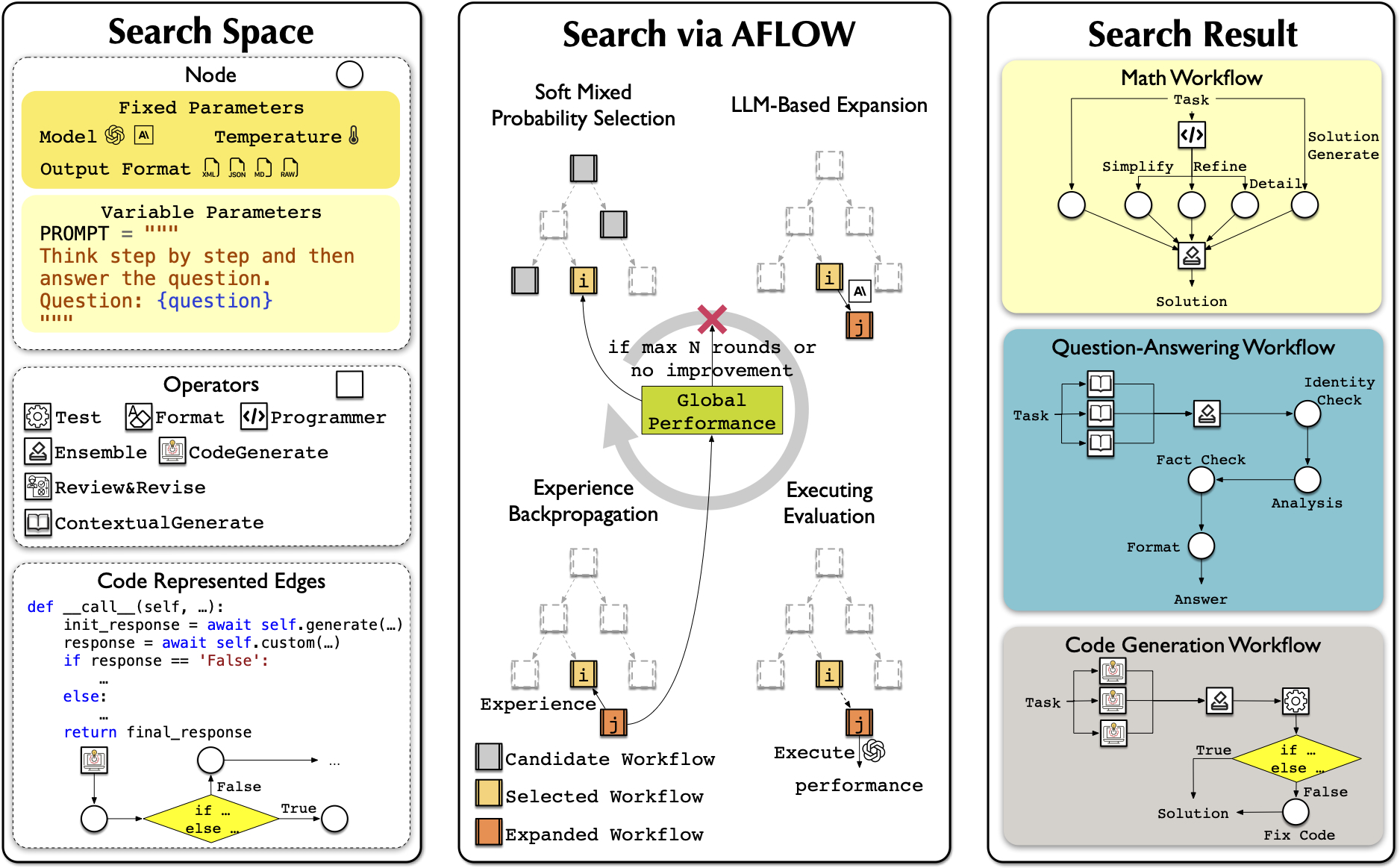AFlow is a framework for automatically generating and optimizing Agentic Workflows. It uses Monte Carlo tree search in a code-represented workflow space to find effective workflows, replacing manual development with machine effort. Our approach shows potential to outperform handcrafted workflows on various tasks.
- Node: Basic unit of LLM invocation. See
metagpt/actions/action_node.pyfor a flexible interface to control LLM, temperature, format, and prompt. - Operator: Predefined combinations of Nodes to enhance search efficiency. Encapsulates common operations like Generate, Format, Review, Revise, Ensemble, Test, and Programmer. See
metagpt/ext/aflow/operator.pyfor details. You can customize your own Operator by referencing the implementations in this code. - Workflow: A sequence of LLM-invoking nodes connected by edges. Can be represented as graphs, neural networks, or code to express various execution structures. See
metagpt/ext/aflow/workflow.pyfor our implementation. - Optimizer: Uses LLMs within a Monte Carlo Tree Search variant to explore and refine workflows. Iteratively selects, expands, evaluates, and updates workflows based on performance. See
metagpt/ext/aflow/scripts/optimizer.pyfor details. - Evaluator: Assesses workflow performance on given tasks. Provides feedback to guide the optimization process towards more effective workflows. See
metagpt/ext/aflow/scripts/evaluator.pyfor details.
We conducted experiments on six datasets (HumanEval, MBPP, GSM8K, MATH, HotpotQA, DROP) and provide their evaluation code. The data can be found in this datasets link, or you can download them using metagpt/ext/aflow/data/download_data.py
For custom tasks, you can reference the code in the metagpt/ext/aflow/benchmark folder. Inherit the BaseBenchmark class and implement evaluate_problem, calculate_score, and get_result_columns to add your custom dataset benchmark. Then, add your benchmark name in metagpt/ext/aflow/scripts/evaluator.py and metagpt/ext/aflow/scripts/optimizer.py to find effective workflows for your custom dataset.
-
Configure optimization parameters:
- Use command line arguments or modify default parameters in
examples/aflow/optimize.py:--dataset # (Required) Dataset type (HumanEval/MBPP/GSM8K/MATH/HotpotQA/DROP) --sample 4 # Sample count - number of workflows to be resampled --optimized_path PATH # Optimized result save path --initial_round 1 # Initial round --max_rounds 20 # Max iteration rounds for AFLOW --check_convergence # Whether to enable early stop --validation_rounds 5 # Validation rounds for AFLOW --if_first_optimize # Set True for first optimization, False afterwards
- Use command line arguments or modify default parameters in
-
Configure LLM parameters in
config/config2.yaml(seeexamples/aflow/config2.example.yamlfor reference) -
Set up operators in
optimize.pyand inoptimized_path/template/operator.py,optimized_path/template/operator.json. You can reference our implementation to add operators for specific datasets -
For first-time use, download datasets and initial rounds by setting
download(["datasets", "initial_rounds"])inexamples/aflow/optimize.py -
(Optional) Add your custom dataset and corresponding evaluation function following the Custom Datasets section
-
(Optional) If you want to use a portion of the validation data, you can set
va_listinexamples/aflow/evaluator.py -
Run the optimization:
# Using default parameters python -m examples.aflow.optimize --dataset MATH # Or with custom parameters python -m examples.aflow.optimize --dataset MATH --sample n --optimized_path xxx ...
- We provide the raw data obtained from our experiments in this link, including the workflows and prompts generated in each iteration, as well as their trajectories on the validation dataset. We also provide the optimal workflow for each dataset and the corresponding data on the test dataset. You can download these data using
metagpt/ext/aflow/data/download_data.py. - You can directly reproduce our experimental results by use different
ExperimentConfigofexamples/aflow/optimize.py.
If you use AFlow in your research, please cite our paper:
@misc{zhang2024aflow,
title={AFlow: Automating Agentic Workflow Generation},
author={Jiayi Zhang and Jinyu Xiang and Zhaoyang Yu and Fengwei Teng and Xionghui Chen and Jiaqi Chen and Mingchen Zhuge and Xin Cheng and Sirui Hong and Jinlin Wang and Bingnan Zheng and Bang Liu and Yuyu Luo and Chenglin Wu},
year={2024},
eprint={2410.10762},
archivePrefix={arXiv},
primaryClass={cs.AI},
url={https://arxiv.org/abs/2410.10762},
}


